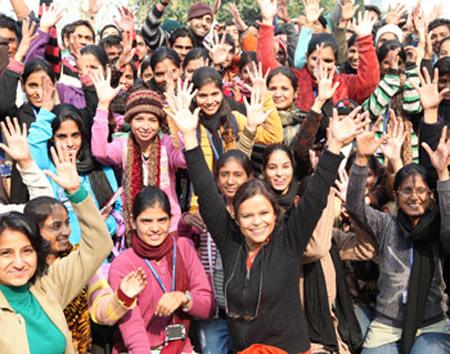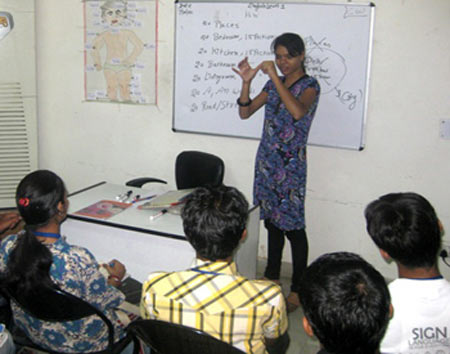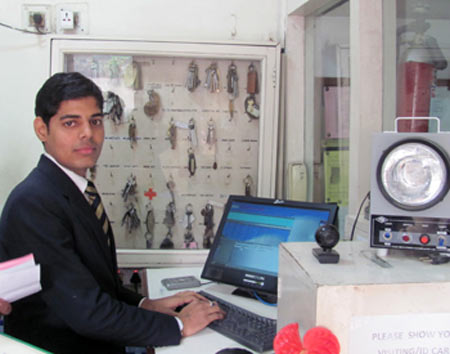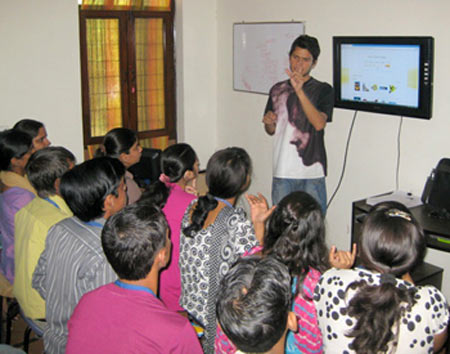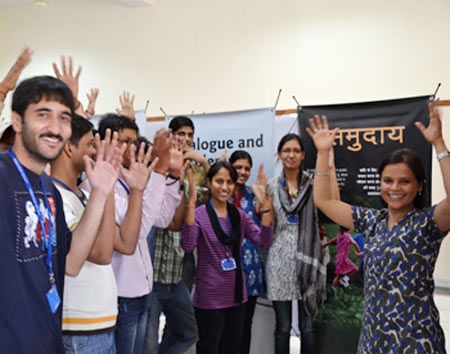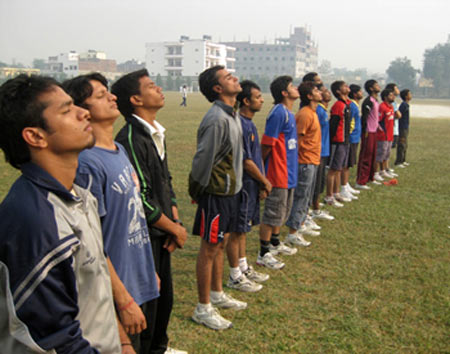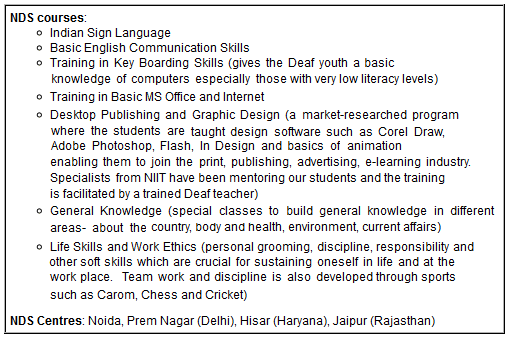 | « Back to article | Print this article |
Preparing the deaf for jobs and life
Educator Ruma Roka speaks about training hearing impaired adults, the challenges and the successes.
Statistics show that in certain job profiles, attrition among hearing people is about 60 per cent, while with hearing impaired employees it is 5 per cent. This pitch has helped the Noida Deaf Society (NDS) place around 450 hearing impaired youth in good companies so far. India has over 12 million such people, yet the education systems have not kept pace.
In this scenario, training institutes like NDS bring a ray of hope. NDS founder Ruma Roka talks to Merril Diniz about their education in India and the way ahead.
How did NDS get started? What were the challenges?
We started with 5 students and now have 700 students a year. So, it's been a long journey and challenges have been many. The first challenge when we started growing was -- where are the teachers? There are no teachers for the deaf community, also no one knows sign language. So, I went to the deaf community and outsourced one person Himanshu and groomed him to take on the role of a teacher. Two, because it's an invisible disability, there's no courseware, and the deaf come with such low literacy.
The big challenge was to create a curriculum.
How did you go about creating one?
I sat with instructional designers, content writers, gave them a background, made them sit through sign language classes, because I had gotten a fair idea of what worked for deaf people and what we wanted to teach them.
'The greatest challenge was to get the deaf child to start thinking differently'
Any other challenges?
Due to the stigma of disability, which is still present in our society, nobody wanted to give space. Now, of course we have. But the bigger challenge was changing the perspective of society for employment.
Can you elaborate?
Changing the perspective that deaf people are a pool of human resources and a value-add. But the greatest challenge was to get the deaf child to start thinking differently. They often come here with no vision of self, of what they can or want to do. They have no idea of life as we know it. That kind of rational thinking and cognitive growth isn't there. The challenge is -- how to train them so that they change. Before making a change outside, the change has to happen within each child.
'We are strict and expect 100 per cent attendance'
How do NDS students get started on this journey?
No deaf youth is refused admission at NDS. We put them through a little test. If he or she is already has a good background of English, comprehension, we can directly put them for a test for other programmes. Otherwise, we say, you will join it six months later.
Right now you need to learn a bit of English and sign language. We give them a strong language foundation through Indian Sign language (ISL) because many kids have no language at all -- so how do we train them?
Developing language gives confidence to communicate, articulate, ask questions. Based on this language foundation we teach other vocational courses. However, we are strict and expect 100 per cent attendance. I feel that you need them to be really empowered, some amount of discipline is necessary.
Give us a background on Indian Sign Language...
ISD has taken shape in India as a structured language and is offered in a curriculum by Ali Yavar Jung National Institute For The Hearing Handicapped, New Delhi.
'Our children are at par with the industry benchmark'
Tell us about your tie-up with NIIT Foundation...
We developed a curriculum with their expertise, and evaluation and certification of our MS Office and Desktop Publishing courses is done by them. The basic IT exam is an online exam, and the certification is all done by the NIIT Foundation. Students get an industry-relevant certificate, which means that our children are at par with the industry benchmark.
Do you also teach soft skills?
Yes, by telling stories and analogies. It's one of the oldest ways of imparting education. Things like taking responsibility of their own life. Not getting angry. They have a lot of pent up anger and irritation -- I don't blame them, because all their lives they have not been able to express themselves. So, we have to talk to them, get them close to their families.
Parents don't understand them and vice-versa. Right from personal grooming to professional. Nails have to be cut. No chewing gum. What I have taught my sons, I will teach my children as well.
'It's a myth that the deaf cannot cope'
Are students coping well?
It's a myth that the deaf cannot cope. We just teach them in a method that they understand -- ISL with visual training methods like LCD projectors, computers, teachers who know sign language.
Tell us about the placement scene.
If there's a change it has to be top-down, so placements are in top companies in hospitality, IT, Banking and publishing, in non-voice, backend, non-client interface roles. From Taj to MPhasis, Axis Bank, Sage and Penguin. I would say that the industry has been good -- just that people don't know about deafness. We do a presentation and contact them through every channel -- cold calls, Google, references.
Usually, we start with a pilot of two kids. We do an icebreaker; teach relevant sign language to immediate people who will interact with the deaf youth, and appoint a "buddy" from the employer who takes on the first point of contact. If it's a success we send more. Every child who gets employed -- I have a night of good sleep!
'I welcome anyone who wants to volunteer'
Minimal fees, free meals, sometimes even haircuts and dental care?
Many of these kids have been starved of any holistic growth. Why should they not go through what we went through when we were growing up? For instance, we have a hairstylist and team here that gives all girls a free haircut. It was very professionally done, and they brought their own chairs and equipment.
Then we have IT professionals coming in. We take part in cricket, badminton and chess championships. Also, 60-70 of them are going for an international film festival on disability.
What's your take on learning?
Make it fun. Learning has to be made as visual because every time, even if it's a haircut or there's someone coming to volunteer, teaching them to do anything -- that itself is a learning, which does not have to happen in a computer or classroom. Most of them have been cut off from learning since childhood -- so I welcome anyone who wants to volunteer, because it means giving them that little bit more.
How do you stay so optimistic?
If the deaf can travel from Meerut and Mathura for a two-hour class, and come with so much hope, then surely I must reflect some of it back to them.
'For me, it's not a job. It's my life'
Your advice to parents of hearing impaired children...
Don't wait till age two to get tested. If your child has residual hearing, go for speech therapy. If not, don't spend 15 years teaching him to speak. He will end up speaking odd sentences; his voice will sound different, because he can't hear himself speak.
Even though deaf education is in limbo, find a way to educate him so he can become a confident adult, who can take care of his own.
Your leadership mantra...
Single-minded focus. I'm not a professional networking type of person. But wherever I would go I talk about deafness. It's what got me here and this wonderful team, who is as good and dedicated. For me, it's not a job. It's my life.
